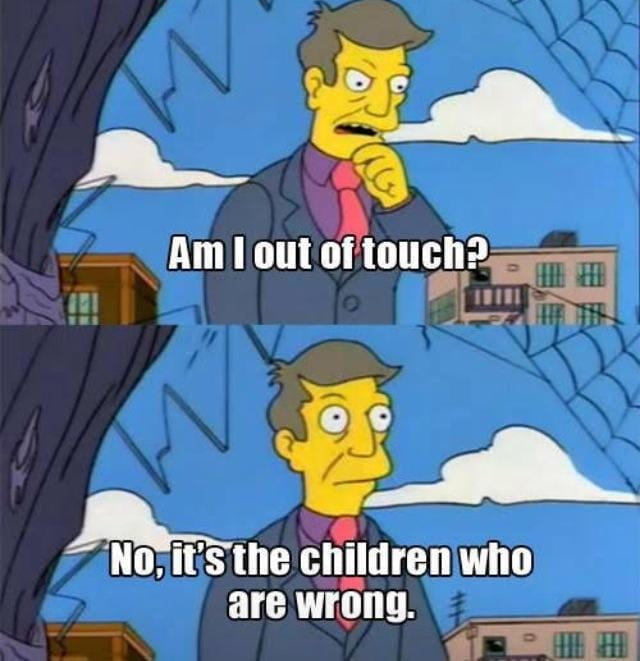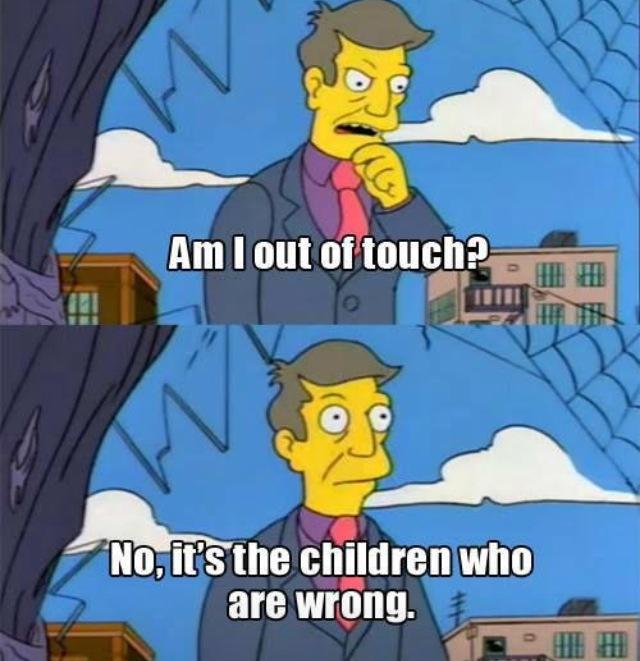teaching and measurement
the slag heap

I’m working on a post/chapter called “That’s not a Measurement.” Like everything I write, it has decided to splay tangents in all directions like the tentacles of a drunk octopus. Amazingly, I did decide to cut some stuff. Here’s a chunk, without context.
I am, or was at any rate, a product of my graduate school training. Before I began working in banking and producing theater, I thought I wanted to be a schoolteacher. I like teaching; I hate schools. It didn’t take me long to recognize what a misfit I was. Before my first and last year of teaching started, at the place I refer to as Uncle Fester Middle School, all of us teachers were preparing our classrooms and decorating bulletin boards in the hallways. Everyone else had inspirational posters with pictures of cats that said, “Hang in there!” I was putting up reproductions of paintings by Basquiat. I bailed at the end of the year.
My experience of teaching isn’t entirely the point, although we’ll come back to that. My experience of graduate school is. I had gone to a fine but lesser-known college for my undergraduate studies, so when I looked at graduate schools one of my criteria was finding the biggest names I could think of. I liked Chicago’s program because it was clear that their teaching program was rigorous in a way that some of the others I was looking at were not. Chicago was going to try to kick my ass, and at 28 I was looking for a fight.
George Hillocks, the advisor of the English Master of Arts in Teaching program, loved children, loved teaching, loved literature and writing, and loved looking under the hood as a social scientist. To combine all those things in one person, I think, is rare. He probably loved looking under the hood the best, though. One of his prominent works was a meta-analysis of teaching studies that concluded that teaching grammar was not only ineffective in improving students’ writing, but to the extent it took class time away from other activities - like, you know, actually practicing writing - it could be said to have a deleterious effect. (I think “deleterious effect” are his words; I regret that I don’t have a copy of the article.) He was passionate about what we were trying to do - teach kids how to read and write - and he was passionate about why we were doing it - because literature and self-expression matter intensely - and he was passionate about doing so in the most effective way, and knowing whether we were being effective teachers, and figuring out how to fix ourselves if we weren’t.
George hated the state-mandated tests in use at the time, called the IGAP - the Illinois Goal Assessment Program - which included an essay portion with a well-defined rubric for scoring a student’s performance. George loathed this thing, even as he made us practice scoring sample essays so we would know what was going to be expected of us as teachers. But he didn’t object to measurement - he insisted that we design our lessons so we could determine whether students had learned what we had hoped to teach them. We had endless classes and exercises about defining learning objectives. We would hand in our carefully planned units of instruction, eight weeks of lesson plans. They would come back covered in red ink. “What’s your test objective?” he would demand. Or, “I don’t know how you’re going to measure that.”
He had no patience for terms like “coverage.” “Teachers will say ‘We covered Mark Twain,’” he’d snort. “That’s nice - did they learn anything?”
So with George living rent-free in our heads, we went off to student teaching and observations with sensitively tuned S-detectors - the “S” in this case standing for “self-delusion.” We quickly learned from these observations and our own experience that it’s fairly easy to pass forty minutes feeling like you’re teaching up a storm. You stand in front of a class and wax brilliant about Richard Cory or Portia and they soak it up - or appear to, at any rate. You tell some jokes and the brighter ones laugh, and the rest laugh because their classmates are laughing. You walk out the door and get a terrible coffee in the teachers’ lounge, impressed with yourself. You can spend forty years doing that; we observed and took notes on teachers who had clearly spent forty years doing that, and the less their students learned, the more they convinced themselves:

And this was one of the challenges that I struggled with as a first-year teacher. I give myself grace, because all first-year teachers suck at the job, and the students they put in front of you just have to take one for the team while you figure out what you’re doing. Learning new things is hard, and the hardest thing about it is seeing how far short of your aspirations you fall, and in teaching it’s especially hard because 125 students a day are watching you suck, and by the way they don’t have a lot of sympathy or mercy.
My grace is limited, because I didn’t go back and try again. Well, it was a tough time; I was living in a new place, in a new relationship, juggling everything. And I was teaching in a school where, two months in, they as much as threatened me with firing for not designing more effective lessons (meaning, mostly, ones where students sat in desks in rows being filled like pitchers); where my department chair responded to my lesson plans with sarcastic comments; where they forced us to teach Call of the Wild, a book no eighth-grader has ever loved but certainly not eighth-graders in the age of the internet; where after I missed a day in the fall because my car had been towed, my colleagues told me my quest for tenure was as good as dead. It was a place where the administration bullied teachers, and teachers bullied students, and the students bullied each other. Did I mention I hate schools? It was that sort of place, and I besmirch the reputation of Uncle Fester by applying his name to that hellhole.
Oh man, am I off-topic. This is a tangent inside a distraction wrapped in bacon.
What was I saying? That my challenge as a teacher was that I was supposed to measure how much students had learned - worse, that I was supposed to judge them based on how much they had learned. (I’m sure that someone out there would say that we’re not “judging” them, etc., but I can assure you as both a former teacher and a former student, adolescents absolutely see their grades as judgments.) And, the tools I was given for measurement weren’t suited to the task. And, the skills and knowledge we were supposed to measure them for were pointless, in my opinion.
You know what’s easy to measure in an English classroom? Not whether students can write well, but whether they have learned the rules of grammar.
You manage what you can measure. The school had tools for measuring things. The tools determined what we taught. In a school you can measure the ability to identify the correct use of the nominative case; in a theater you can count the number of butts in seats. What was your objective again?
notes for nobody but myself is a reader-supported publication. To receive new posts and support my work, consider becoming a free or paid subscriber.